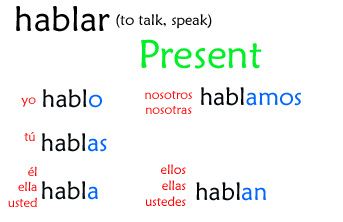Hola. Señor Jordan here yet again. This video lesson will be going over all of the forms of the present tense regular -AR verb. If you haven’t looked at the previous videos in this series, you might check those out before watching this one. Enjoy!
Hope this enlightened you. Feel free to leave any questions/comments/suggestions pertaining to this video.
Verb conjugation:

Vocabulario:
ayudar (en casa)- to help (around the house)
bailar – to dance
cantar – to sing
cocinar – to cook
dibujar – to draw
enseñar – to teach
escuchar (música) – to listen to (music)
estudiar (español) – to study (Spanish)
hablar (por teléfono) – to talk (on the telephone)
nadar – to swim
necesitar – to need
patinar – to skate
practicar – to practice
terminar – to end, finish
tocar (la guitarra) – to play (guitar)
trabajar – to work
bien – well, fine
en – in
un museo – a museum
mal – bad, poorly
muy – very
las ciencias – science
la tienda – the store
por la noche – at night
unos lápices – some pencils
un poco – a little
—————————–
Related video(s):
Sr Jordan,
I have been a Spanish teacher for 38 yrs… just getting started! About 36 yrs ago, I got very frustrated that my students could not answer basic questions. So I started making diagrams that show how to answer questions.
You are the only other teacher I ever saw who did this.
Las grandes mentes…. (Y me encantan tus videos. Te los agrdezco)
Muchas gracias,
Sr Y
In Spain you use vosotros/vosotras (informal) with people you are familiar with, and ustedes in formal situation. In Latin America you use just ustedes for anyone.
thx bro
Thanks!
Please say a little more less detail!!!!!!!!
😛
YO HABLA ESPANOL
Hola Señor Jordan,
My students just noticed that on the slide that has the nosotros form you go on to give an example about how it can be nosotrAS for all females. Just want to let you know that my students are awesome and noticed that you wrote ‘nosotrOs’ instead of ‘nosotrAs.’ I’m so proud! We just love your videos and use them in class all the time. You rock!
hi thank you
Hola Sr. Jordan.
Could you please explain why the el is at the end of the sentence in ‘Cante bien el?’
Also, is it more appropriate if ‘tambien’ is at the end or the beginning of the sentence? Or does it depend on the sentence? Please let me know which is more appropriate in Spain.
Gracias!
Yo hablo mal espanol.
Hi Senor Jordan
I enjoy Spanish and enjoy helping others improve with their Spanish. You do such a great job teaching it, that I will always recommend your Spanish website to everyone that needs help with Spanish:)
Thanks for being so awesome:)
Maya Freestone
Senor Jordan,
I love your videos! I am a teacher and use them in my classes. I just had a suggestion for this video, especially at the part where you’re quizzing students in Spanish to English. I noticed you always use the subject pronoun in the sentence and then ask students to translate. If it’s a verb-ending recognition activity, maybe leaving off the subject pronoun would help. Otherwise students could rely on the pronoun and get it right each time, not realizing they don’t really know the verb endings. Then a present tense quiz in class may be surprisingly difficult when the pronouns are missing. Sure, you need them sometimes for clarification, but sometimes not. Just a thought. Either way, I love that you only teach one form of the verb per video and always review in each video. Great job!
Thank you so much for these videos. As a Spanish teacher, I use your videos to help students who have trouble with reading and recalling information. They can study with your videos at home to help them understand and recall what they learned in class. You’re so helpful!
a brilliant web resource
on this video
i noticed you wrote
ellos cocinomos mucho for we men / we men+women
but use nosotros again instead of nosotras when is is a female only ‘we’
again excellent
i go to andaculia twice a year and i will be using your videos
What exactly is the difference between por and para? I automatically use por for phrases like “por telefono” but its more of muscle memory than because I actually understand why I use por. I used to get the uses of por and para mixed up in my head and now I seem to have forgotten all together. Any help would be greatly appreciated!
Love the videos!
Dielle
Hi,
First of all I’d like to tell you that your videos are great. Your full of enthusiasm… pleasent to watch and also very helpful.
I was wondering how come in none of your videos on the verbs subject you do not mention about the vosotros, vosotras form? Is there any specific reason?
Anyways keep up the great work,
Lukasz.
Adios!
Señor Jordan,
Thanks for your videos. I was wondering when you are going to do a video on the
imperfect, I’ve been seeing it as “coming soon” for a while. Keep up the good work!
Mary Jo